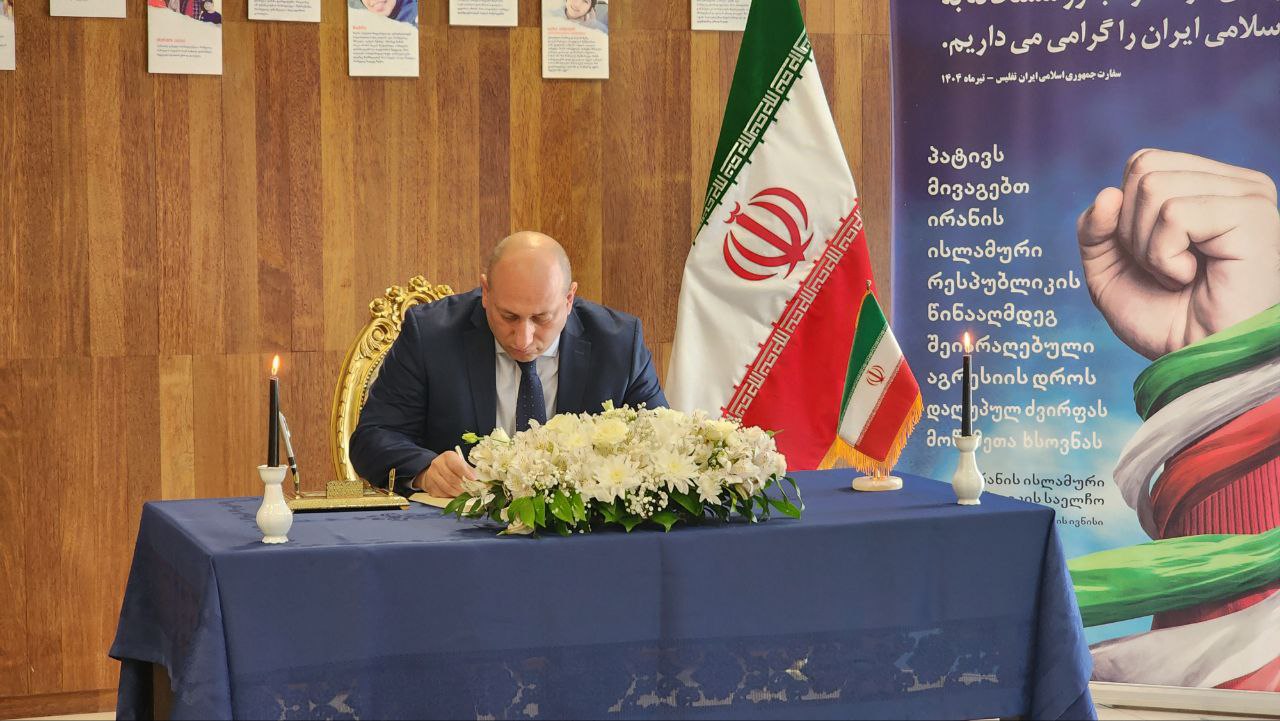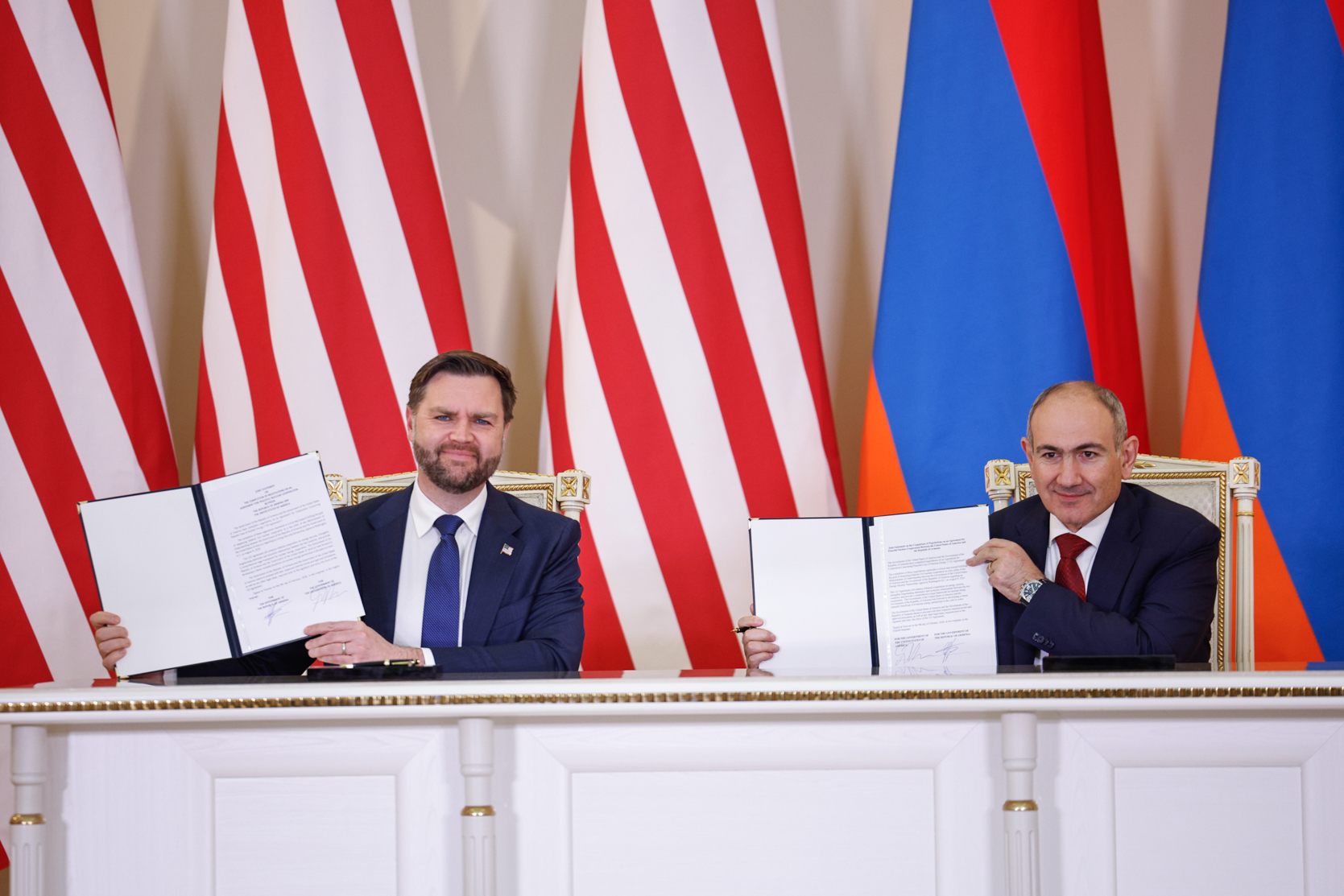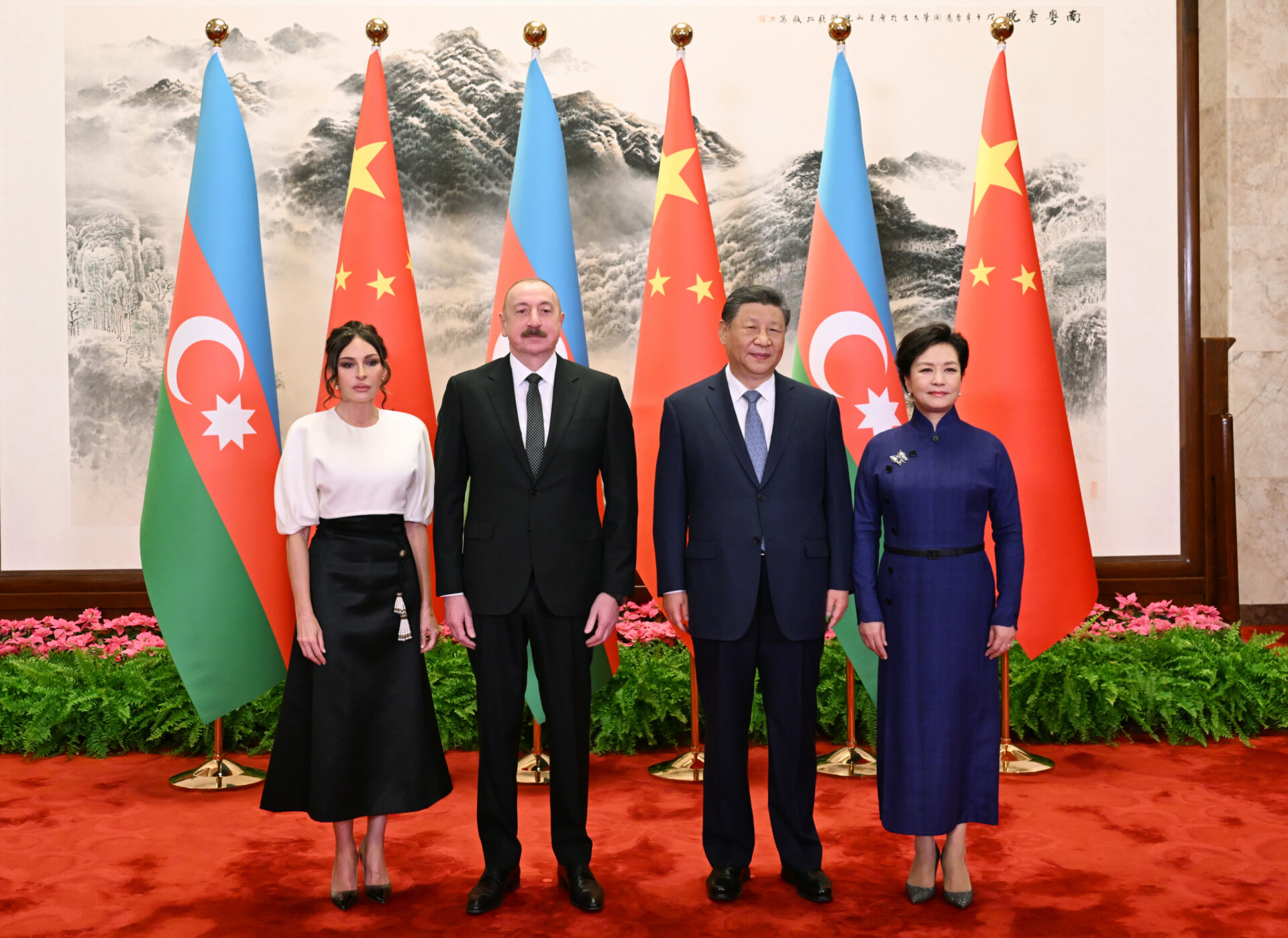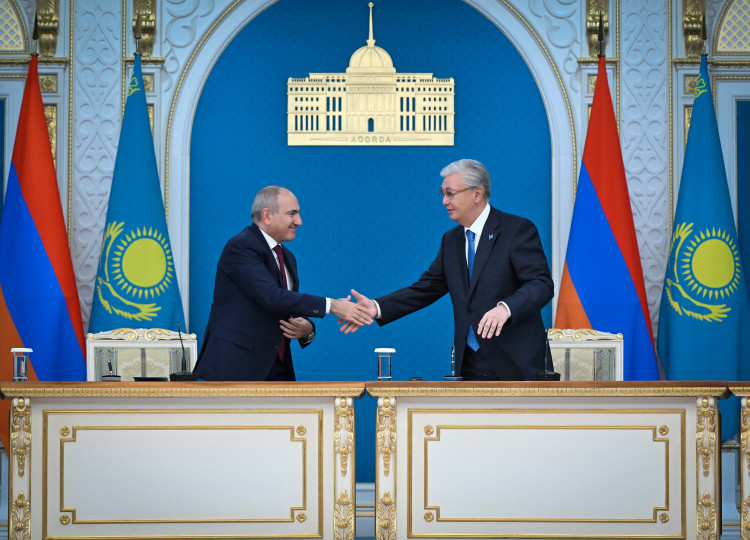
Georgian Authorities Establishing Dangerous Ties with Iran Against West
Georgian Authorities Establishing Dangerous Ties with Iran Against West
Executive Summary:
- Georgia’s Deputy Foreign Minister Alexander Khvtisiashvili expressed solidarity with Iran following the Israeli airstrikes, sparking outrage from the Israeli Embassy and raising domestic accusations of Georgian Dream acting as a regional proxy for Tehran.
- Russia is intensifying efforts to pull Georgia into strategic regional frameworks, positioning Iran as a key partner, which aligns with Georgian Dream’s pivot away from the West.
- Iran’s connectivity and economic presence in Georgia has been rapidly growing under Georgian Dream, marked by a surge in Iranian companies, residents, and trade.
On July 2, the Iranian Embassy in Georgia reported that the Deputy Minister of Foreign Affairs of Georgia, Alexander Khvtisiashvili, made a surprise visit to the to express his condolences to “those killed in the Israeli attack and to express solidarity with Iran” (Facebook/iraningeorgia; 1tv.ge, July 2). The Israeli Embassy in Georgia immediately expressed outrage over Georgia’s act of solidarity towards Iran (Radio Tavisupleba, July 2). In Georgia, some opposition politicians and the expert community are comparing Georgian Dream to Hamas and Hezbollah, calling the ruling party a proxy force of Iran (Tvpirveli.ge, July 3). Georgian Dream appears to be attempting to exact revenge on the West for its criticism with such provocative steps, while simultaneously moving toward implementing the Kremlin’s plans. In particular, Dmitry Masyuk, Deputy Director of the Fourth Department of the Commonwealth of Independent States (CIS) Countries at the Russian Foreign Ministry, recently stated that Russia is committed to further normalizing relations with Georgia and would be ready for its connection to the International North–South Transport Corridor (INSTC) (TASS, July 1). Iran plays a key role in the INSTC, connecting the Russian port of St. Petersburg with the Indian port of Mumbai (see EDM, July 13, 2022, June 7, 2023, January 23, 2024). The agreement on the creation of an international transport corridor, approximately 7,200 kilometers (~4,470 miles) in length, was signed in 2000 by Russia, Iran, and India (see EDM, March 6, 2024). Later, Azerbaijan, Armenia, Belarus, Kazakhstan, Türkiye, Tajikistan, Kyrgyzstan, and other countries joined the initiative (CIS, December 6, 2023).
After the recent military escalation between Israel and Iran, the pro-Western part of society in Georgia hoped that Moscow’s efforts to bring Tbilisi closer to Tehran were on the verge of collapse. In Georgia, many assumed that the Israeli military operation against Iran would stop Georgian Dream from being able to promote rapprochement with Tehran under Moscow’s instigation. Presumptively, Moscow and Tbilisi have already reached a verbal agreement on cooperation with Iran, including the potential inclusion of Georgia in the 3+3 format, where Iran plays a key role for Russia (see EDM, March 17). On July 1, a representative of the Russian Foreign Ministry reiterated that the doors for Georgia’s participation in the regional 3+3 format remain open (TASS, July 1).
A change in the geopolitical situation in the South Caucasus could hinder Moscow’s plan and the full-fledged formation of the regional 3+3 format, the purpose of which is to expel Western influence from the South Caucasus region. Except for Georgia, three major regional actors are already participating in the format—Russia, Iran, Türkiye—and the two other South Caucasus countries—Azerbaijan and Armenia. Even if the Kremlin does manage to convince Tbilisi to join this format, however, it is not yet clear how long Armenia, which has recently taken a course toward integration with the European Union, or Azerbaijan, which has entered into confrontation with the Kremlin, will remain in this format (see EDM, January 16, April 21, July 7).
Iran’s economic and political influence in Georgia has become increasingly noticeable in recent years, growing in tandem with the decline of Western influence in the country. After Georgian Prime Minister Irakli Kobakhidze made two unscheduled visits to Iran in 2024—once for the funeral of the Iranian president and soon after for the inauguration of the new president—Georgia’s loss of its traditional geopolitical identity became clear, as expressed by its desire for the West (Civil Georgia, July 30, 2024). No one in Georgia expected Georgian Dream to go as far as to express solidarity with Iran. Georgian Dream’s act of solidarity with Tehran challenges Tbilisi’s traditional affiliation with the Western world and underscores the party’s desire to forge close alliances with authoritarian countries.
Iran’s soft power influence is already noticeable in Georgia. According to the National Statistics Office of Georgia, over the past 10 years, 10,000 Iranian citizens have arrived in Georgia for permanent residence (Business Press News, June 30). The Georgian government is withholding the number of citizens of the Islamic Republic of Iran who have been granted Georgian citizenship. Statistical sources state that “the data is confidential information” (Georgia Online, April 24). Following the rise to power of Georgian Dream, the number of private companies established in Georgia by Iranian citizens has increased significantly. In 2010, only 84 Iranian companies were registered in Georgia (Tabula.ge, August 8, 2013). Between 2013 and 2024, however, 9,300 such companies were registered, including 125 new companies registered in 2025 (Business Media, June 25). In the context of U.S. sanctions against Iran, Georgia is gradually becoming a market for Iranian products. Of the total trade turnover of $322 million between Georgia and Iran in 2024, $285 million was imported products from Iran to Georgia. Iran primarily exports ferrous metals, construction materials, plastic products, and food products to Georgia (Transparency.ge, May 30). Additionally, Due to the visa-free regime for Iranian citizens, the number of visitors from Iran to Georgia is growing. According to the Georgian National Tourism Administration, 146,000 visitors from Iran visited Georgia in 2024 (Business Press News, May 30).
The previous Georgian government, under the initiative of then-pro-Western President Mikheil Saakashvili, introduced a visa-free regime for Iranian citizens in January 2011, which allowed Iranian citizens to visit Georgia for tourism purposes without a visa for 45 days (Civil Georgia, July 2, 2013). This occurred as a result of then-Iranian Foreign Minister Manouchehr Mottaki’s visit to Georgia in November 2010. The Iranian diplomat called the decision to abolish visas by Georgia “historic and unforgettable” (Civil Georgia, November 3, 2010). The Georgian government at that time was pursuing a pro-Western and pro-U.S. policy, which, of course, made Iran dissatisfied, and accordingly, Tehran perceived such a step positively. At that time, Mottaki stated that Georgia should be for Iran and Iran for Georgia, and thus the Black Sea would be connected to the Persian Gulf (Civil Georgia, November 3, 2010). Georgian Dream, using nationalist slogans and speaking out against the influx of Asian visitors, soon after coming to power in July 2013, abolished the visa-free regime for Iranian citizens. In February 2016, however, a visa-free regime was reintroduced for Iranian citizens. Georgian Dream has pursued an ambiguous policy toward Iran, and because it has had active ties with the West, there appeared to be no need to express interest in close relations with Tehran. Moreover, in 2018, the Iranian Ministry of Foreign Affairs advised its citizens not to visit Georgia without a special reason, following the deportation and entry ban imposed on some Iranian citizens (Tasnim News, December 10, 2018). Such tension followed the massive refusal to allow hundreds of Iranian citizens to enter Georgia. In 2018, according to official statistics, 434 Iranian citizens were denied entry into Georgia (Georgian Ministry of Internal Affairs, 2018).
This period coincided with a record number of Iranian visitors to Georgia. In 2018, 291,000 Iranians visited the country (Business Press News, May 30). During this time, ultra-nationalist media sounded the alarm about the alleged Iranians actively buying up real estate in Georgia (Myth Detector, July 24, 2018). In 2018, the Saudi Arabian publication “Al Arabiya” published an article about Iran’s missionary and propaganda activities in Georgia, highlighting that Iran is cautiously yet purposefully expanding its influence among ethnic Azerbaijanis in the country (Al Arabiya, April 3, 2020). Georgian Dream chose to utilize the anti-Iranian theme to fuel a nationalist narrative. Now, however, amid tense relations with the West, Georgian Dream is using rapprochement with Iran as a means to counter the West and is no longer focused on the risks associated with such a rapprochement.
While Georgia was once viewed in the West as a springboard for the spread of Western influence, including in the Middle East region, it is now turning into a prime location for opportunists against the West, in the hands of Iran, Russia, and the People’s Republic of China (PRC). In 2020, some in the West took note of the connections between Georgian Dream and Iran. In a letter to then-Secretary of State Mike Pompeo, U.S. senators pointed out attempts by Iranian businessmen to use Georgia’s financial institutions to circumvent U.S. sanctions. The senators also noted Georgia’s Black Sea port of Batumi, which Iran was interested in for the illegal oil trade (U.S. Senator Ted Cruz, May 15, 2020).
On July 7, U.S. Ambassador to Georgia Robin L. Dunnigan, who is completing her mandate in the country, revealed details during her farewell interview with the Georgian Service of Radio Liberty about a non-public letter sent to the U.S. presidential administration on behalf of the Georgian Dream leadership. According to the U.S. ambassador, this letter “was threatening, insulting, unserious, and was received extremely poorly in Washington” (YouTube/@Radio-Tavisupleba, July 7).
For Russia, Iran, and the PRC, Georgian Dream, isolated from the outside world and driven into a corner, is a valuable strategic tool. Moscow, Tehran, and Beijing are in a position to use Georgian Dream to harm Western influence in the region with minimal effort. In the context of the highly complex new geopolitical alignment in the South Caucasus, however, this goal may falter. Amid the escalation of tensions between Russia and Azerbaijan and Armenia’s turn toward the West, Georgia is presented as a geopolitical outlier that could be leveraged to the advantage of Russia, Iran, and the PRC.


